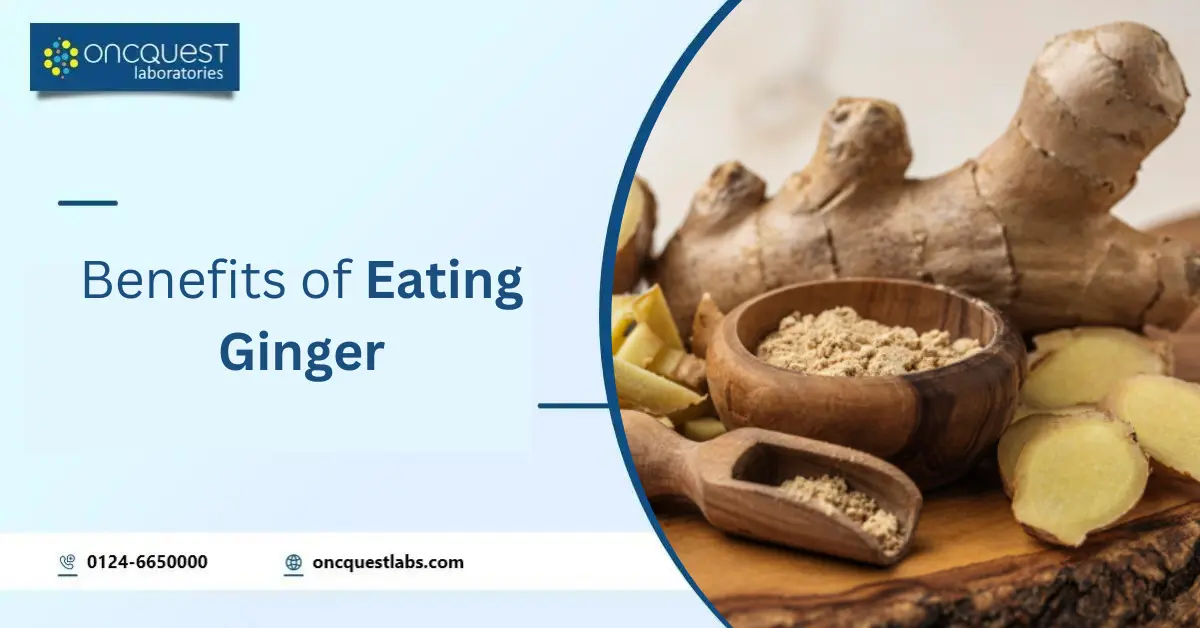Ginger, a flowering plant native to Southeast Asia, has been celebrated for centuries not only as a culinary spice but also for its powerful medicinal properties. Known scientifically as Zingiber officinale, ginger’s pungent and aromatic rhizome is widely used in cooking and natural medicine across various cultures. Historically, ginger has been a staple in traditional medicine systems such as Ayurveda, Traditional Chinese Medicine (TCM), and herbal remedies worldwide. Its popularity stems from its ability to treat a wide range of ailments, from digestive issues to inflammation.
In modern times, scientific research has validated many of the health benefits attributed to ginger, making it a popular natural remedy in the West as well. This versatile root is packed with essential nutrients and bioactive compounds that contribute to its impressive health benefits. Whether consumed fresh, dried, powdered, or as an oil or juice, ginger offers numerous advantages that can enhance overall well-being. This article delves into the multifaceted benefits of eating ginger, exploring how this potent spice can positively impact various aspects of health.
Contents
- 1 Nutrition of Ginger
- 2 Benefits of Eating Ginger
- 2.1 Digestive Health
- 2.2 Bloating and Gas
- 2.3 Gingerol
- 2.4 Keeps Your Mouth Healthy
- 2.5 Wear and Tear on cells
- 2.6 Anti-Inflammatory and Antioxidant Effects
- 2.7 Pain Reduction
- 2.8 Cardiovascular Health
- 2.9 Immune System Support
- 2.10 Respiratory Health
- 2.11 Anti-Cancer Properties
- 2.12 Weight Loss and Metabolic Health
- 3 Ginger Side Effects
- 4 Eating Raw Ginger Benefits
- 5 Benefits of Eating Raw Ginger in Empty Stomach
- 6 How to Incorporate Ginger into Your Diet
- 7 Conclusion
- 8 Frequently Asked Questions (FAQ)
Nutrition of Ginger
Sure! Here’s a table detailing the nutritional profile of ginger (per 100 grams of fresh ginger root):
| Nutrient | Amount per 100g | % Daily Value* |
| Calories | 80 kcal | 4% |
| Carbohydrates | 17.8 g | 6% |
| Protein | 1.8 g | 4% |
| Fat | 0.8 g | 1% |
| Fiber | 2.0 g | 8% |
| Sugars | 1.7 g | – |
| Vitamin C | 5 mg | 8% |
| Vitamin B6 | 0.2 mg | 10% |
| Folate | 11 µg | 3% |
| Niacin (B3) | 0.7 mg | 4% |
| Riboflavin (B2) | 0.03 mg | 2% |
| Pantothenic Acid (B5) | 0.2 mg | 2% |
| Iron | 0.6 mg | 3% |
| Magnesium | 43 mg | 11% |
| Phosphorus | 34 mg | 3% |
| Potassium | 415 mg | 12% |
| Zinc | 0.3 mg | 2% |
| Copper | 0.2 mg | 10% |
| Manganese | 0.2 mg | 10% |
| Selenium | 0.7 µg | 1% |
*Note: Percent Daily Values (%DV) are based on a 2,000 calorie diet. Your daily values may be higher or lower depending on your calorie needs.
Benefits of Eating Ginger
Ginger (Zingiber officinale) is not only a popular culinary spice but also a powerful natural remedy known for its broad spectrum of health benefits. Its active compounds, such as gingerol, have been the subject of numerous studies, highlighting ginger’s potential in promoting health and preventing various ailments. Here, we delve deeper into the multifaceted benefits of consuming ginger
Digestive Health
Ginger is renowned for its digestive health benefits. It stimulates saliva, bile, and digestive enzyme production, which aids in the efficient breakdown of food. This helps alleviate indigestion and bloating. Ginger also accelerates gastric emptying, reducing the feeling of fullness. Additionally, it is highly effective in relieving nausea, including morning sickness during pregnancy and nausea caused by motion sickness, chemotherapy, or surgery. By promoting smoother digestion and providing quick relief from common digestive discomforts, ginger proves to be an invaluable natural remedy for maintaining a healthy digestive system.
Bloating and Gas
Ginger is an effective natural remedy for bloating and gas. Its carminative properties help relax the gastrointestinal muscles, facilitating the release of trapped gas and reducing bloating. Consuming ginger can enhance digestive efficiency, preventing the buildup of gas. Whether taken as a tea, added to meals, or consumed as a supplement, ginger soothes the digestive tract and alleviates discomfort. Incorporating ginger into your diet can lead to a more comfortable and well-functioning digestive system, reducing instances of bloating and gas.
Gingerol
Gingerol is the primary bioactive compound in ginger, responsible for much of its medicinal properties. This powerful antioxidant and anti-inflammatory agent gives ginger its distinct spicy flavor. Gingerol helps combat oxidative stress by neutralizing free radicals, which can protect cells from damage. It also exhibits strong anti-inflammatory effects, making it effective in reducing pain and inflammation, particularly in conditions like arthritis. Additionally, gingerol has antimicrobial and anticancer properties, contributing to ginger’s overall health benefits, including improved digestion, pain relief, and enhanced immune function.
Keeps Your Mouth Healthy
Ginger plays a significant role in maintaining oral health due to its antibacterial properties. Compounds like gingerol in ginger can help inhibit the growth of oral bacteria, reducing the risk of infections, cavities, and gum diseases such as gingivitis. Additionally, ginger’s anti-inflammatory effects can soothe inflamed gums and reduce oral discomfort. Regular consumption of ginger, whether in raw form, as tea, or in recipes, can promote fresher breath and overall better oral hygiene, contributing to a healthier mouth.
Wear and Tear on cells
Wear and tear on cells, often caused by oxidative stress, can lead to cellular damage and aging. Ginger, particularly its active compound gingerol, has potent antioxidant properties that help combat this damage. By neutralizing free radicals, ginger reduces oxidative stress and protects cells from premature aging and degeneration. This protection supports overall cellular health, enhancing the body’s ability to repair and maintain tissues. Regular consumption of ginger can contribute to healthier cells, reducing the risk of chronic diseases and promoting longevity.
Anti-Inflammatory and Antioxidant Effects
Ginger is celebrated for its powerful anti-inflammatory and antioxidant properties. The key compound, gingerol, found in fresh ginger, has potent anti-inflammatory effects, helping to reduce inflammation in the body. This can be beneficial in managing conditions like arthritis, cardiovascular diseases, and other inflammatory disorders. Additionally, ginger’s antioxidant properties help combat oxidative stress by neutralizing free radicals, protecting cells from damage, and potentially reducing the risk of chronic diseases. Regular consumption of ginger can thus support overall health, enhance the immune system, and promote longevity by mitigating inflammation and oxidative damage in the body.
Pain Reduction
Ginger is a natural remedy known for its pain-relieving properties. It is effective in reducing menstrual pain, often equating to the effectiveness of over-the-counter pain medications. Additionally, ginger can alleviate arthritis pain by reducing inflammation in the joints, improving mobility, and easing discomfort. It also helps reduce muscle pain and soreness from exercise. Regular consumption of ginger can provide significant relief from various types of pain, making it a valuable addition to pain management routines without the side effects associated with conventional painkillers.
Cardiovascular Health
Ginger offers significant benefits for cardiovascular health. It helps lower blood pressure by promoting better circulation and relaxing blood vessels. Additionally, ginger can reduce bad cholesterol (LDL) levels and increase good cholesterol (HDL), thus lowering the risk of heart disease. Its anti-inflammatory properties also support heart health by reducing arterial inflammation, which can prevent heart attacks and strokes. Moreover, ginger helps regulate blood sugar levels, contributing to overall metabolic health. Including ginger in your diet can therefore be a heart-healthy choice, supporting a robust cardiovascular system and reducing the risk of heart-related ailments.
Immune System Support
Ginger is a powerful ally for the immune system. Its antibacterial and antiviral properties help fight off infections and keep illnesses at bay. Rich in antioxidants, ginger supports the immune system by reducing oxidative stress and inflammation, which enhances the body’s natural defenses. Additionally, ginger helps soothe respiratory infections, alleviating symptoms of colds and sore throats. Regular consumption of ginger can strengthen the immune response, making it more efficient at combating pathogens. By incorporating ginger into your diet, you can boost your immune system and maintain better overall health.
Respiratory Health
Ginger is renowned for its ability to support respiratory health through multiple mechanisms. Its potent anti-inflammatory properties help reduce inflammation in the respiratory system, providing relief from conditions like asthma and bronchitis. Ginger’s antibacterial and antiviral properties contribute to fighting respiratory infections, including colds and flu, while its expectorant qualities aid in loosening and expelling mucus, easing congestion and cough symptoms. Additionally, ginger’s soothing effects can alleviate throat irritation and discomfort. By boosting immune function and reducing oxidative stress, ginger supports overall respiratory well-being, making it a valuable natural remedy for maintaining healthy lungs and airways.
Anti-Cancer Properties
Ginger exhibits promising anti-cancer properties, primarily attributed to its bioactive compounds such as gingerol and paradol. These compounds have been shown to inhibit the growth of cancer cells and induce apoptosis (cell death) in various types of cancer, including colorectal, ovarian, and pancreatic cancers. Ginger’s anti-inflammatory and antioxidant effects also play a role in cancer prevention by reducing chronic inflammation and oxidative stress, which are linked to cancer development. While more research is needed to fully understand ginger’s role in cancer treatment, incorporating ginger into a balanced diet may offer protective benefits against cancer and support overall health.
Weight Loss and Metabolic Health
Ginger benefits weight loss and metabolic health due to several key properties. It boosts metabolism by increasing thermogenesis, which helps the body burn more calories and fat. Ginger also aids in appetite control by promoting feelings of fullness, potentially reducing overall calorie intake. Its ability to regulate blood sugar levels supports stable energy levels and reduces cravings. Additionally, ginger’s anti-inflammatory effects can improve insulin sensitivity, which is crucial for maintaining healthy blood sugar levels. Ginger can be a valuable addition to a weight loss regimen and overall metabolic health strategy by enhancing metabolism, promoting satiety, and supporting insulin function.
Ginger Side Effects
While ginger is generally safe for most people, there are some potential side effects and considerations to keep in mind:
Gastrointestinal Issue
While ginger is beneficial for digestion, excessive consumption can lead to gastrointestinal issues. High doses may cause heartburn, stomach discomfort, and diarrhea in some individuals. This is due to ginger’s strong, active compounds, which can irritate the stomach lining if consumed in large quantities. To avoid these side effects, it’s recommended to start with small amounts and gradually increase intake, monitoring how your body responds. If gastrointestinal issues persist, it’s best to reduce ginger consumption and consult a healthcare provider for personalized advice.
Blood Thinning
Ginger has natural blood-thinning properties due to compounds like salicylates. These can help prevent blood clots, reducing the risk of cardiovascular events such as strokes and heart attacks. However, this effect can pose a risk for individuals taking anticoagulant medications or those with bleeding disorders, as it may enhance the risk of excessive bleeding. It’s important to consult a healthcare provider before significantly increasing ginger intake if you are on blood-thinning medications or have any related health concerns to ensure safety and proper management.
Allergic Reactions
Allergic reactions to ginger are rare but possible. Symptoms may include skin rash, itching, swelling, or difficulty breathing. People with known allergies to ginger or related plants (such as turmeric or cardamom) are more likely to experience these reactions. It’s essential to perform a patch test before using ginger topically or consuming it in large quantities. If allergic symptoms occur, discontinue use and seek medical advice promptly. Severe allergic reactions require immediate medical attention, including difficulty breathing or swelling of the throat, face, or tongue.
Low Blood Sugar
Ginger may lower blood sugar levels, making it potentially beneficial for managing diabetes but posing risks for hypoglycemia. Individuals taking diabetes medications or insulin should monitor their blood sugar closely when consuming ginger, as it could enhance the effects of these medications, leading to excessively low blood sugar levels. It’s advisable to consult a healthcare provider before regularly using ginger as a supplement if you have diabetes or are on medications that affect blood sugar levels. Maintaining awareness and adjusting medication doses as necessary can help manage potential risks associated with ginger consumption.
Interactions with Medications
Ginger can interact with various medications due to its effects on enzymes involved in drug metabolism and its blood-thinning properties. It may interact with anticoagulants, increasing the risk of bleeding. Additionally, ginger might affect medications for diabetes and high blood pressure by lowering blood sugar and blood pressure levels. It’s crucial to consult healthcare providers before using ginger supplements, especially if taking medications for these conditions. They can provide personalized advice on safe consumption and potential adjustments to medication dosages to avoid adverse interactions.
It’s advisable to consult a healthcare provider before adding significant amounts of ginger to your diet, especially if you have existing health conditions or are taking medication.
Eating Raw Ginger Benefits
Raw ginger is a powerhouse of nutrients and bioactive compounds that offer numerous health benefits. Consuming raw ginger can provide more concentrated doses of these beneficial components compared to cooked or processed forms. Here are some of the key benefits of eating raw ginger:
Enhanced Digestive Health
Raw ginger stimulates the production of saliva, bile, and digestive enzymes, promoting efficient digestion. It can help alleviate indigestion, reduce bloating, and accelerate gastric emptying, providing quick relief from digestive discomforts.
Potent Anti-Inflammatory Properties
The active compounds in raw ginger, such as gingerol, have strong anti-inflammatory effects. These properties can help reduce inflammation in the body, potentially benefiting individuals with conditions like arthritis and other inflammatory disorders.
Strong Antioxidant Activity
Raw ginger is rich in antioxidants that help combat oxidative stress by neutralizing free radicals. This protection can reduce the risk of chronic diseases, slow down the aging process, and enhance overall health.
Effective Nausea Relief
Raw ginger is highly effective in reducing various types of nausea, including morning sickness during pregnancy, motion sickness, and nausea related to chemotherapy. Chewing on a small piece of raw ginger or adding it to beverages can provide quick relief.
Pain Reduction
Consuming raw ginger can help reduce pain, especially menstrual pain, muscle soreness, and pain associated with osteoarthritis. Its anti-inflammatory and analgesic properties make it a natural alternative to painkillers.
Improved Cardiovascular Health
Raw ginger can support heart health by helping to lower blood pressure, reduce LDL cholesterol levels, and improve circulation. Its anti-inflammatory properties also contribute to cardiovascular well-being by reducing arterial inflammation.
Boosted Immune System
The antibacterial and antiviral properties of raw ginger enhance the immune system’s ability to fight infections. Regular consumption can help prevent colds, flu, and other infections, while also reducing the severity of symptoms.
Enhanced Metabolic Health and Weight Loss
Raw ginger can boost metabolism, aiding in weight management and fat loss. It promotes feelings of fullness, helping to control appetite and reduce overall calorie intake. Additionally, it helps regulate blood sugar levels, supporting metabolic health.
Benefits of Eating Raw Ginger in Empty Stomach
Consuming raw ginger on an empty stomach can amplify its health benefits, as it allows the body to absorb its active compounds more efficiently. Here are some of the notable benefits:
Reduced Inflammation
Starting your day with raw ginger can help reduce systemic inflammation. Its anti-inflammatory compounds, like gingerol, work more effectively when absorbed on an empty stomach, potentially alleviating symptoms of conditions like arthritis and inflammatory bowel disease.
Improved Circulation and Cardiovascular Health
Raw ginger can help improve blood circulation by dilating blood vessels and preventing blood clots. Consuming it on an empty stomach maximizes its effects on heart health, potentially lowering blood pressure and reducing cholesterol levels, thus supporting overall cardiovascular health.
Detoxification
Ginger’s ability to stimulate digestion and circulation can aid in the body’s natural detoxification processes. Eating it on an empty stomach can help flush out toxins more effectively, promoting clearer skin and better organ function.
Enhanced Cognitive Function
The antioxidants in ginger can protect brain cells from oxidative stress. Consuming raw ginger on an empty stomach can enhance cognitive function, improve memory, and potentially reduce the risk of
How to Incorporate Ginger into Your Diet
Incorporating ginger into your diet is easy and can be done in various enjoyable ways. Here are some practical tips:
- Fresh Ginger: Peel and grate fresh ginger to add to stir-fries, soups, curries, and marinades for a burst of flavor and health benefits.
- Ginger Tea: Steep fresh ginger slices or grated ginger in hot water to make a soothing and aromatic ginger tea. Add honey and lemon for extra flavor and additional health benefits.
- Smoothies: Blend fresh or powdered ginger into your favorite smoothie recipes for a spicy kick and added nutritional value.
- Salad Dressings: Mix grated ginger with olive oil, vinegar, and herbs to create a zesty and healthy salad dressing.
- Baked Goods: Incorporate powdered ginger into baked goods like cookies, muffins, and bread for a warm and spicy flavor.
- Sauces and Dips: Use ginger in sauces and dips for meats, vegetables, or as a topping for sushi.
- Pickled Ginger: Enjoy pickled ginger as a tasty accompaniment to sushi or Asian dishes.
- Ginger Shots: Make ginger shots by blending fresh ginger with water or juice for a concentrated dose of ginger’s health benefits.
- Ginger Candy: Indulge in ginger candy or crystallized ginger as a sweet and spicy treat with digestive benefits.
- Capsules or Supplements: If you prefer, ginger is also available in capsule or supplement form for convenience and consistent dosage.
By incorporating ginger into your daily meals and snacks, you can enjoy its distinctive flavor while reaping its numerous health benefits, ranging from digestive support and anti-inflammatory properties to immune system enhancement and beyond.
Conclusion
In conclusion, ginger stands out not only as a versatile culinary ingredient but also as a potent natural remedy with a wide array of health benefits. From aiding digestion and reducing inflammation to supporting cardiovascular health, ginger has been valued for centuries in traditional medicine systems and continues to be validated by modern scientific research. Its antioxidant, anti-inflammatory, and immune-boosting properties make it a valuable addition to any diet aimed at promoting overall health and well-being. Whether enjoyed fresh, as a tea, in cooking, or as a supplement, incorporating ginger into your daily routine can provide significant health advantages.
Frequently Asked Questions (FAQ)
How much ginger should I consume daily for health benefits?
- The general recommendation is to consume up to 1-2 grams of ginger per day, which is equivalent to about 1 teaspoon of grated fresh ginger or 2-4 cups of ginger tea.
Can ginger help with weight loss?
- Yes, ginger can aid weight loss by boosting metabolism, promoting feelings of fullness, and supporting stable blood sugar levels. However, it is not a substitute for a balanced diet and regular exercise.
Is ginger safe for everyone to consume?
- Generally, ginger is safe for most people when consumed in moderate amounts. However, individuals with gallbladder issues, pregnant women (in excessive amounts), and those taking blood-thinning medications should consult with a healthcare professional before consuming ginger regularly.
How does ginger help with nausea and motion sickness?
- Ginger has been shown to reduce nausea and vomiting by affecting the nervous system and gastrointestinal tract. It is commonly used to alleviate symptoms of motion sickness, morning sickness during pregnancy, and nausea from chemotherapy or surgery.





